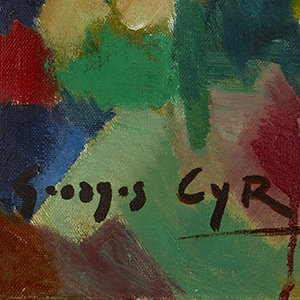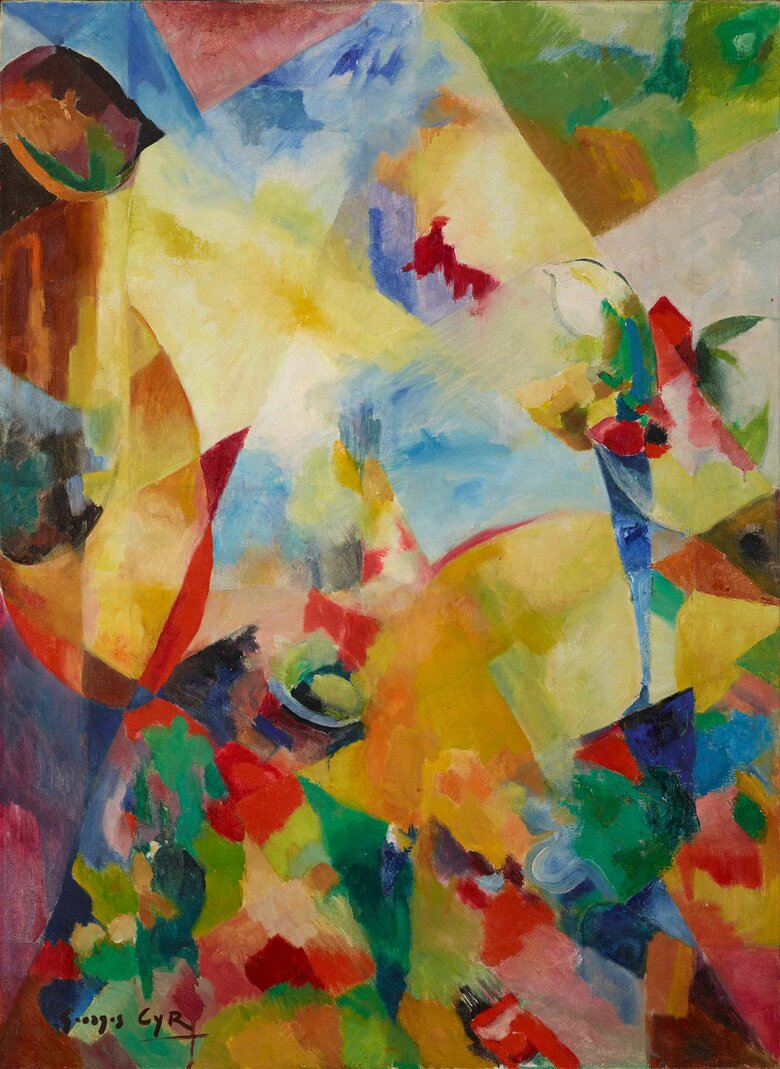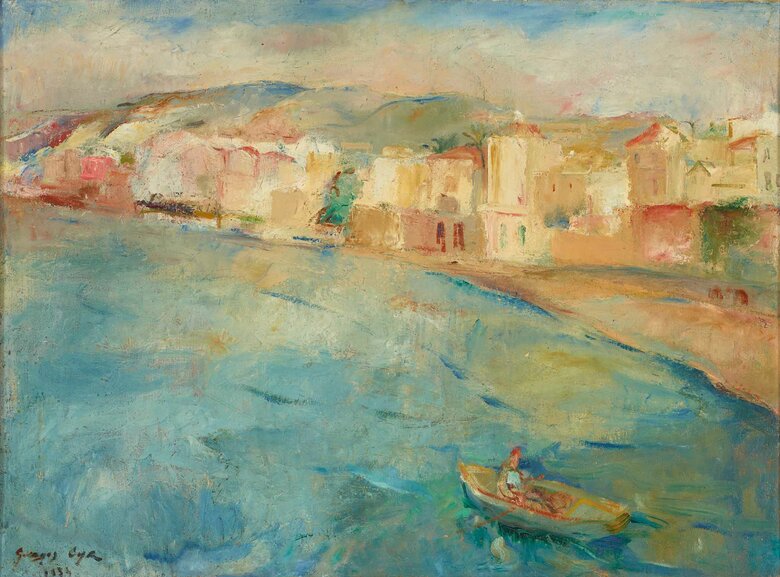Painter Georges Cyr was born in Montgeron, France in 1881. At the urging of French impressionist painter Armand Guillaumin, he began his artistic career in 1910, exhibiting at the Salon des...


GEORGES CYR, Lebanon (1881 - 1964)
Bio
Written by L'OR IMAN PUYMARTIN
Painter Georges Cyr was born in Montgeron, France in 1881. At the urging of French impressionist painter Armand Guillaumin, he began his artistic career in 1910, exhibiting at the Salon des Independents in 1924. Ten years later, in 1934, Cyr fell upon hard times, and after some personal issues decided to leave France for a tour of the Middle East. When he reached Beirut, he purportedly experienced “love at first sight,” and decided to make it his permanent home. The latter half of his life was spent in the thick of the city’s burgeoning art scene, where his Ain El Mraisse studio was such a popular meeting place for likeminded creatives that they referred to it informally as an “art school.”
In France, Cyr adhered to the basic aesthetic principles of the Rouen School, a term describing mainly French artists who lived in the city of Rouen during the early 20th century, practicing post- and neo-Impressionist styles. As evidenced in Monet’s famous depictions of the city’s cathedral, Rouen had been an important hub of Impressionist activity, inhabited intermittently by artists like Sisley and Pissarro, and was equally important to the development of post-Impressionistic techniques. Painters such as Joseph Delattre and Charles Angrand seized on new techniques, particularly Seurat’s pointillism, and continued the Impressionist legacy of painting en plein air. The influence of the Rouen School can be seen most clearly in Cyr’s oil paintings, which feature light, airy brushstrokes, vivid colors, and animated compositions.
Though he produced a rich corpus of oil paintings inspired by the Lebanese landscape, Cyr made his livelihood in Beirut by selling watercolors. His visit to the “Paris of the Middle East” was initially intended to be temporary, but after a few weeks in the city yielded new friends both French and Lebanese, the artist found himself unable to leave. To Cyr, what Lebanon lacked in traditional Western arts institutions was made up for in the richness of culture and the company of the close friends he made—the first being a Lebanese poet by the name of Georges Schehadé. Cyr’s studio became a social and intellectual crossroads for artists and writers, frequented by such esteemed characters as Shafic Abboud, Omar Onsi, Moustafa Farroukh and Elie Kanaan. Lebanon offered Cyr a sense of warmth, comfort, and hospitality that was completely foreign to him, and preferred its pace of life to the hustle of Paris. It also gave him a sense of importance and relevance, as he was able, to some extent, to teach Lebanese art students the techniques and aesthetics he had learned in his native France. Of course, Onsi, Farroukh, and others had completed their educations in France as well, so much of Cyr’s knowledge was redundant, but he nevertheless encouraged the study and practice of cubism among local artists and made a major impression on the Beiruti art scene.
His paintings of numerous subjects—landscapes, marine, still life, nudes, and portraits—became freer and livelier as the artist got older, characterized by looser, more powerful brushstrokes and bolder use of light. In the 1940s, the artist experienced a crisis of confidence in which he questioned the impact his work would have on the history of art, worried he had not created anything significant enough to mark it. Fueled by his faltering ego, he abandoned watercolor in favor of oil paint and returned to cubism, with which he had flirted in the 1930s. His later cubist paintings draw their color palette from the warm tones of the Mediterranean, and incorporate the hazy, dreamlike handling of paint that distinguished many of the Rouen School painters. Though he returned to Paris yearly in hopes of gaining recognition in France, Cyr’s career was rooted in Lebanon for the final two decades of his life. The artist passed away in Beirut in 1964, just a year after his final exhibition.
Sources
"Georges Cyr." The Park Gallery. Accessed November 28, 2017. http://theparkgallery.com/artist/georges-cyr/.
"Rouen Tourisme." Rouen Normandie Tourisme & Congrès. Accessed November 28, 2017. http://www.rouentourisme.com/lecole-de-rouen/#.
Tyan, Liliane. Georges Cyr dans les collections libanaises . Beyrouth: Fondation Audi, 2007.
CV
Selected Solo Exhibitions
1965
Retrospective, Vendome Hotel, Beirut, Lebanon
1935
St. Georges Hotel, Beirut, Lebanon
Stade du Chayla, Beirut, Lebanon
Selected Group Exhibitions
2024
Lebanese Landscapes, Agial Art Gallery, Beirut, Lebanon
2020
A Glimpse Into The Past, Galerie Tanit, Beirut, Lebanon
2012
Art from Lebanon - Modern and Contemporary artists: 1880 – 1975, Beirut Exhibition Center, Beirut, Lebanon
1924
Salon des Indépendants, Paris, France
Awards and Honors
1962
Lebanese National Order of the Cedar, Officer of the Legion d’Honneur
Collections
Bank Audi, Beirut, Lebanon
Ramzi and Saeda Dallul Art Foundation, Beirut, Lebanon
Havre Museum, France
Press
معرض استعادي يلقي ضوءاً على مساره التشكيلي . الفرنسي جورج سير شارك في تأسيس الفن اللبناني الحديث .pdf
GalerieBertran.pdf
جورج سير_ تحيّة وفاء.pdf
GEORGES CYR Artwork
Become a Member
Join us in our endless discovery of modern and contemporary Arab art
Become a Member
Get updates from DAF
Follow Artists
Save your favourite Artworks
Share your perspectives on Artworks
Be part of our community
It's Free!
We value your privacy
TermsCookiesPrivacy Policies
Become a Member
Get updates from DAF
Follow Artists
Save your favourite Artworks
Share your perspectives on Artworks
Be part of our community
It's Free!
We value your privacy
TermsCookiesPrivacy Policies
Become a Member
Get updates from DAF
Follow Artists
Save your favourite Artworks
Share your perspectives on Artworks
Be part of our community
It's Free!
We value your privacy
TermsCookiesPrivacy Policies
Welcome to the Dalloul Art Foundation
Thank you for joining our community
If you have entered your email to become a member of the Dalloul Art Foundation, please click the button below to confirm your email and agree to our Terms, Cookie & Privacy policies.
We value your privacy, see how
Become a Member
Get updates from DAF
Follow Artists
Save your favourite Artworks
Share your perspectives on Artworks
Be part of our community
It's Free!
We value your privacy
TermsCookiesPrivacy Policies






